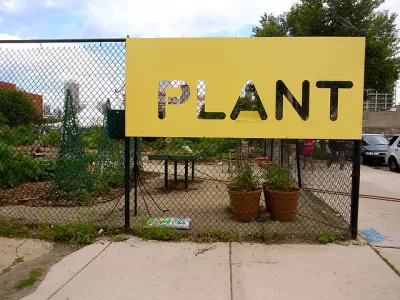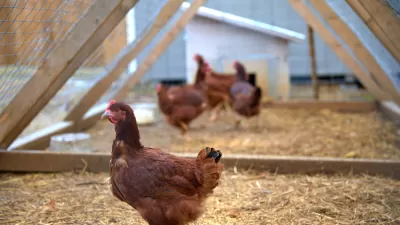It can be easier for Chicago's urban gardeners to grow produce than to sell it.

Urban agriculture is not new, and while the practice experienced a boom in the 1970s, "Chicago’s city planners were slow to catch up to the ubiquity of the city’s gardens and farms," Christian Belanger argues in Southside Weekly.
Advocates for urban farming like Ken Dunn, founder of the Resource Center, want simple licensing for the community gardens and urban farms. Dunn's organization runs City Farm, which is a moving farm that has grown produce on the city's north and south sides in various vacant locations. "Dunn believes the city should institute the City Farm model on a large scale, temporarily turning many of the city’s vacant properties into short-term urban farms that would benefit communities with high unemployment rates," Belanger reports. To serve these goals Dunn believes the city should make it straightforward to license these businesses.
"Actually selling their products, though, has been a surprisingly tricky process for many farmers to navigate. Currently, farmers largely have two business licenses available to them: a peddler’s license for small-scale farmers, and a wholesale license for bigger operations," Belanger reports. A peddler's license requires each person involved to buy a license, which can be expensive and may slow these businesses from hiring, and the wholesale license has a number of requirements around infrastructure and inspection. As a result, many of the urban farms in the city operate without a license in a legal grey area.
FULL STORY: License to Grow

Alabama: Trump Terminates Settlements for Black Communities Harmed By Raw Sewage
Trump deemed the landmark civil rights agreement “illegal DEI and environmental justice policy.”

Planetizen Federal Action Tracker
A weekly monitor of how Trump’s orders and actions are impacting planners and planning in America.

The 120 Year Old Tiny Home Villages That Sheltered San Francisco’s Earthquake Refugees
More than a century ago, San Francisco mobilized to house thousands of residents displaced by the 1906 earthquake. Could their strategy offer a model for the present?

In Both Crashes and Crime, Public Transportation is Far Safer than Driving
Contrary to popular assumptions, public transportation has far lower crash and crime rates than automobile travel. For safer communities, improve and encourage transit travel.

Report: Zoning Reforms Should Complement Nashville’s Ambitious Transit Plan
Without reform, restrictive zoning codes will limit the impact of the city’s planned transit expansion and could exclude some of the residents who depend on transit the most.

Judge Orders Release of Frozen IRA, IIJA Funding
The decision is a victory for environmental groups who charged that freezing funds for critical infrastructure and disaster response programs caused “real and irreparable harm” to communities.
Urban Design for Planners 1: Software Tools
This six-course series explores essential urban design concepts using open source software and equips planners with the tools they need to participate fully in the urban design process.
Planning for Universal Design
Learn the tools for implementing Universal Design in planning regulations.
Clanton & Associates, Inc.
Jessamine County Fiscal Court
Institute for Housing and Urban Development Studies (IHS)
City of Grandview
Harvard GSD Executive Education
Toledo-Lucas County Plan Commissions
Salt Lake City
NYU Wagner Graduate School of Public Service



























